Evaluating AI's Role in Business Strategy & Workforce Management
VerifiedAdded on 2023/06/10
|9
|2023
|163
Report
AI Summary
This report analyzes the impact of artificial intelligence (AI) on business strategy and workforce management in the 21st century. It evaluates the role of AI in enhancing sales, fraud detection, customer experiences, and predictive analysis across various industries. The report uses HR theory, specifically the organizational life cycle theory, to understand how AI implementation varies at different stages of organizational maturity. It also discusses the significance of talent acquisition, learning and development, and change management in a competitive global climate, emphasizing the importance of skilled labor, employee motivation, and strategic change implementation using Lewin's change management theory. The conclusion highlights the transformative changes in business operations due to the pandemic and the necessity of adopting AI for efficient workforce management and strategic decision-making.
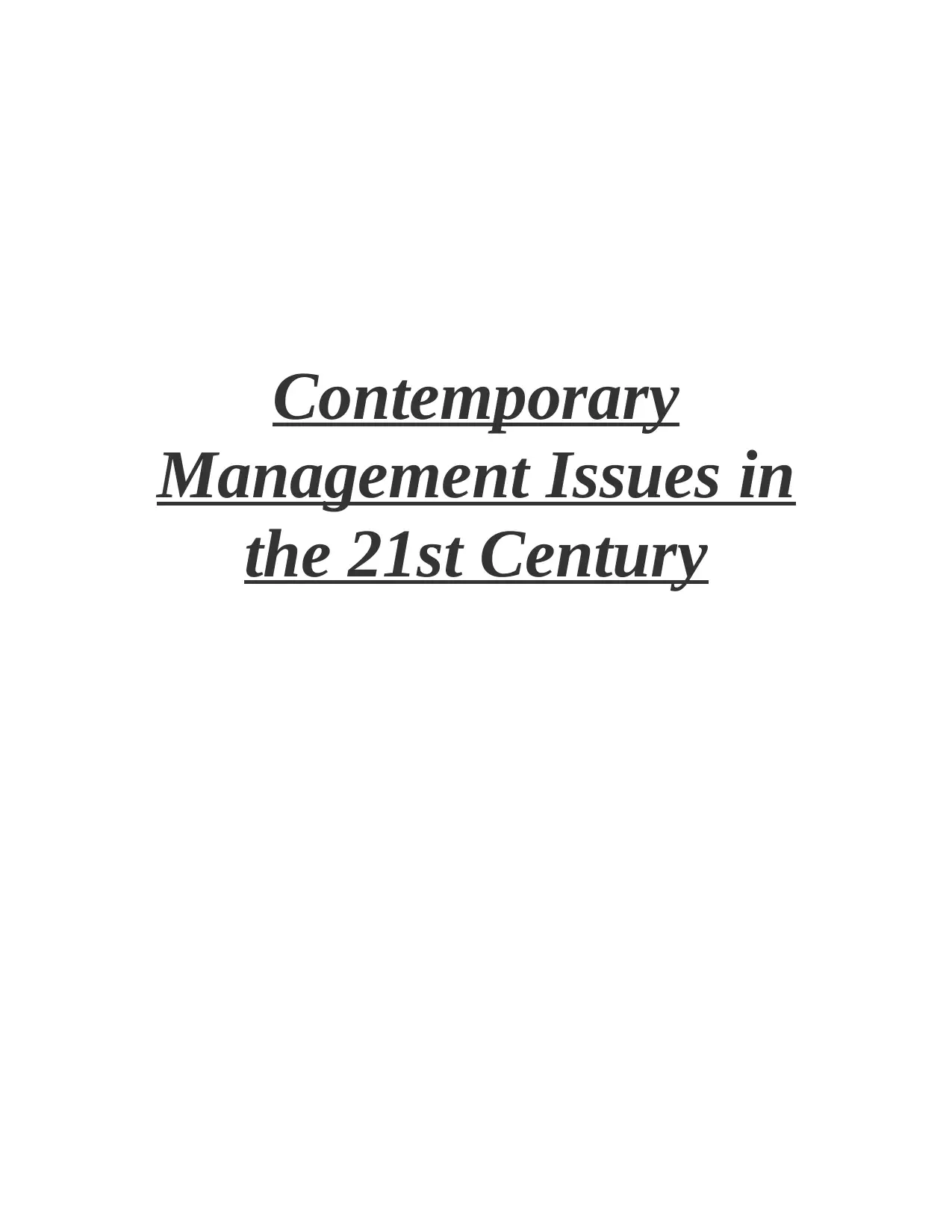
Contemporary
Management Issues in
the 21st Century
Management Issues in
the 21st Century
Paraphrase This Document
Need a fresh take? Get an instant paraphrase of this document with our AI Paraphraser
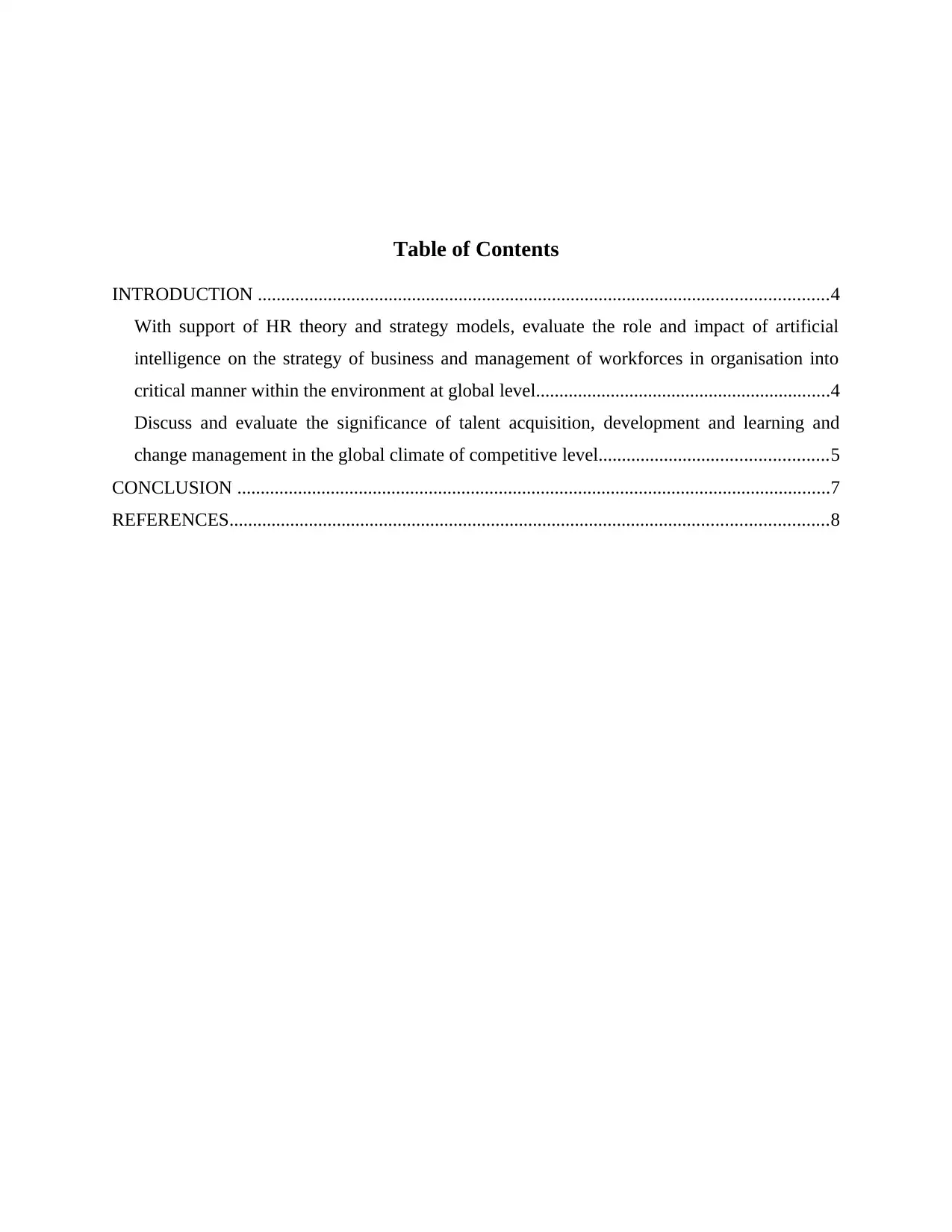
Table of Contents
INTRODUCTION ..........................................................................................................................4
With support of HR theory and strategy models, evaluate the role and impact of artificial
intelligence on the strategy of business and management of workforces in organisation into
critical manner within the environment at global level...............................................................4
Discuss and evaluate the significance of talent acquisition, development and learning and
change management in the global climate of competitive level.................................................5
CONCLUSION ...............................................................................................................................7
REFERENCES................................................................................................................................8
INTRODUCTION ..........................................................................................................................4
With support of HR theory and strategy models, evaluate the role and impact of artificial
intelligence on the strategy of business and management of workforces in organisation into
critical manner within the environment at global level...............................................................4
Discuss and evaluate the significance of talent acquisition, development and learning and
change management in the global climate of competitive level.................................................5
CONCLUSION ...............................................................................................................................7
REFERENCES................................................................................................................................8
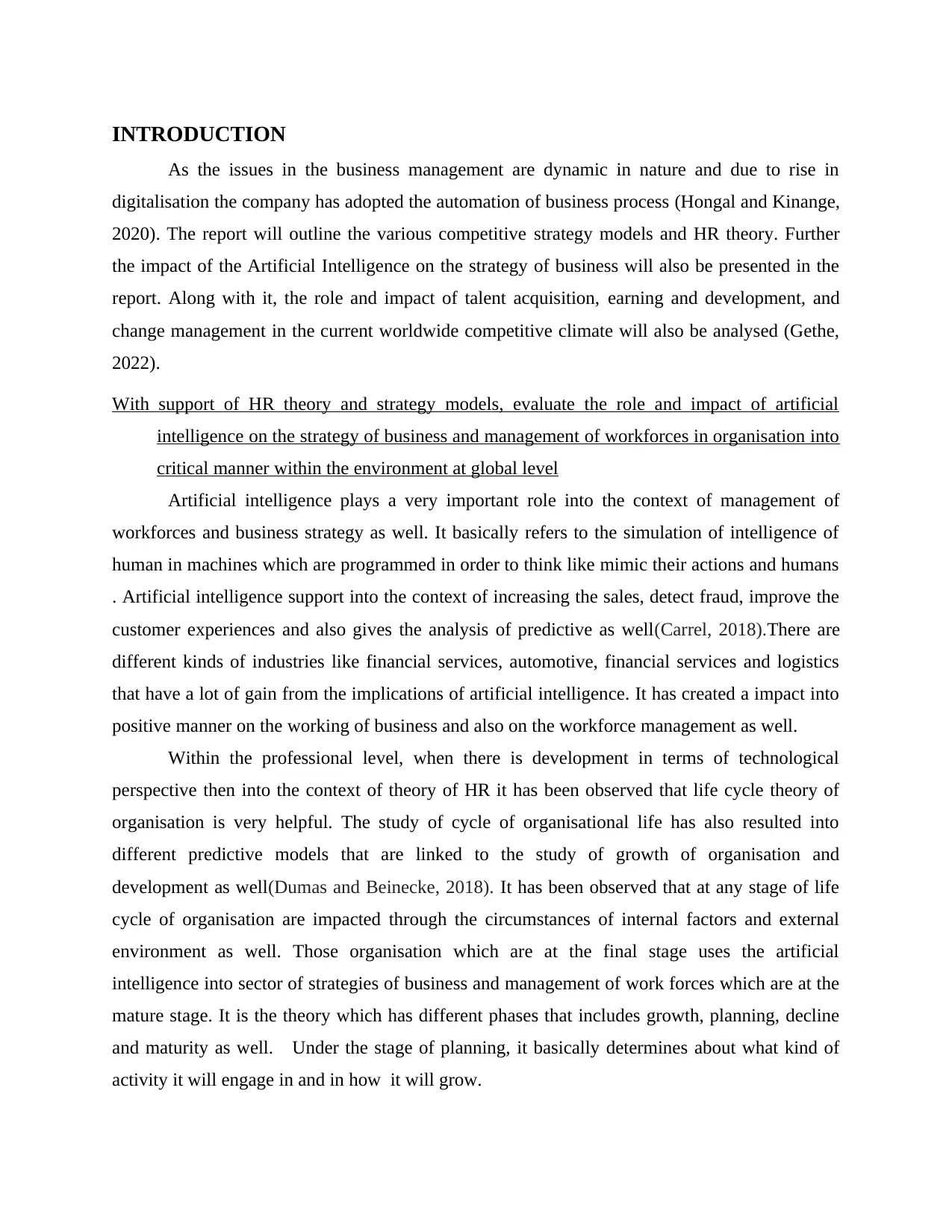
INTRODUCTION
As the issues in the business management are dynamic in nature and due to rise in
digitalisation the company has adopted the automation of business process (Hongal and Kinange,
2020). The report will outline the various competitive strategy models and HR theory. Further
the impact of the Artificial Intelligence on the strategy of business will also be presented in the
report. Along with it, the role and impact of talent acquisition, earning and development, and
change management in the current worldwide competitive climate will also be analysed (Gethe,
2022).
With support of HR theory and strategy models, evaluate the role and impact of artificial
intelligence on the strategy of business and management of workforces in organisation into
critical manner within the environment at global level
Artificial intelligence plays a very important role into the context of management of
workforces and business strategy as well. It basically refers to the simulation of intelligence of
human in machines which are programmed in order to think like mimic their actions and humans
. Artificial intelligence support into the context of increasing the sales, detect fraud, improve the
customer experiences and also gives the analysis of predictive as well(Carrel, 2018).There are
different kinds of industries like financial services, automotive, financial services and logistics
that have a lot of gain from the implications of artificial intelligence. It has created a impact into
positive manner on the working of business and also on the workforce management as well.
Within the professional level, when there is development in terms of technological
perspective then into the context of theory of HR it has been observed that life cycle theory of
organisation is very helpful. The study of cycle of organisational life has also resulted into
different predictive models that are linked to the study of growth of organisation and
development as well(Dumas and Beinecke, 2018). It has been observed that at any stage of life
cycle of organisation are impacted through the circumstances of internal factors and external
environment as well. Those organisation which are at the final stage uses the artificial
intelligence into sector of strategies of business and management of work forces which are at the
mature stage. It is the theory which has different phases that includes growth, planning, decline
and maturity as well. Under the stage of planning, it basically determines about what kind of
activity it will engage in and in how it will grow.
As the issues in the business management are dynamic in nature and due to rise in
digitalisation the company has adopted the automation of business process (Hongal and Kinange,
2020). The report will outline the various competitive strategy models and HR theory. Further
the impact of the Artificial Intelligence on the strategy of business will also be presented in the
report. Along with it, the role and impact of talent acquisition, earning and development, and
change management in the current worldwide competitive climate will also be analysed (Gethe,
2022).
With support of HR theory and strategy models, evaluate the role and impact of artificial
intelligence on the strategy of business and management of workforces in organisation into
critical manner within the environment at global level
Artificial intelligence plays a very important role into the context of management of
workforces and business strategy as well. It basically refers to the simulation of intelligence of
human in machines which are programmed in order to think like mimic their actions and humans
. Artificial intelligence support into the context of increasing the sales, detect fraud, improve the
customer experiences and also gives the analysis of predictive as well(Carrel, 2018).There are
different kinds of industries like financial services, automotive, financial services and logistics
that have a lot of gain from the implications of artificial intelligence. It has created a impact into
positive manner on the working of business and also on the workforce management as well.
Within the professional level, when there is development in terms of technological
perspective then into the context of theory of HR it has been observed that life cycle theory of
organisation is very helpful. The study of cycle of organisational life has also resulted into
different predictive models that are linked to the study of growth of organisation and
development as well(Dumas and Beinecke, 2018). It has been observed that at any stage of life
cycle of organisation are impacted through the circumstances of internal factors and external
environment as well. Those organisation which are at the final stage uses the artificial
intelligence into sector of strategies of business and management of work forces which are at the
mature stage. It is the theory which has different phases that includes growth, planning, decline
and maturity as well. Under the stage of planning, it basically determines about what kind of
activity it will engage in and in how it will grow.
⊘ This is a preview!⊘
Do you want full access?
Subscribe today to unlock all pages.

Trusted by 1+ million students worldwide
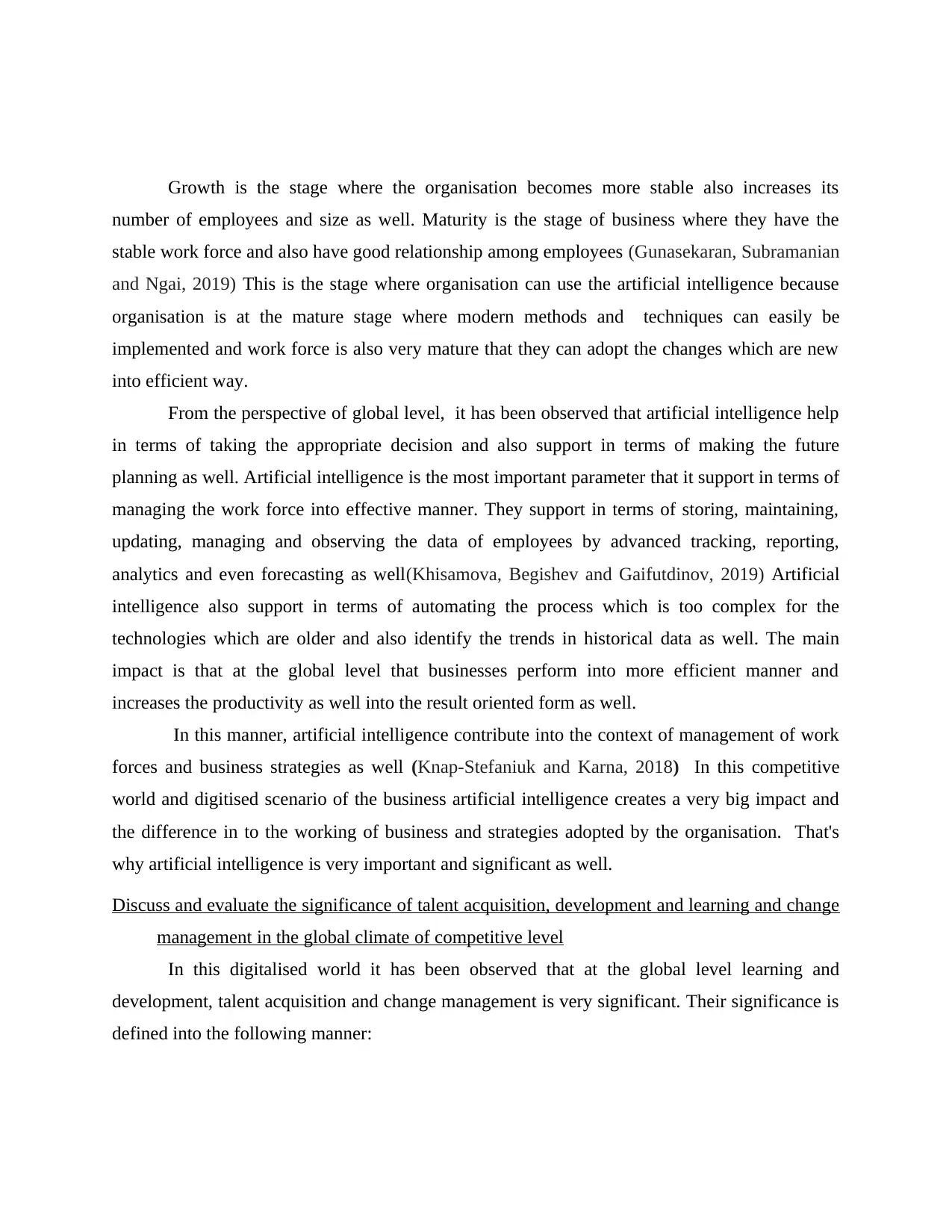
Growth is the stage where the organisation becomes more stable also increases its
number of employees and size as well. Maturity is the stage of business where they have the
stable work force and also have good relationship among employees (Gunasekaran, Subramanian
and Ngai, 2019) This is the stage where organisation can use the artificial intelligence because
organisation is at the mature stage where modern methods and techniques can easily be
implemented and work force is also very mature that they can adopt the changes which are new
into efficient way.
From the perspective of global level, it has been observed that artificial intelligence help
in terms of taking the appropriate decision and also support in terms of making the future
planning as well. Artificial intelligence is the most important parameter that it support in terms of
managing the work force into effective manner. They support in terms of storing, maintaining,
updating, managing and observing the data of employees by advanced tracking, reporting,
analytics and even forecasting as well(Khisamova, Begishev and Gaifutdinov, 2019) Artificial
intelligence also support in terms of automating the process which is too complex for the
technologies which are older and also identify the trends in historical data as well. The main
impact is that at the global level that businesses perform into more efficient manner and
increases the productivity as well into the result oriented form as well.
In this manner, artificial intelligence contribute into the context of management of work
forces and business strategies as well (Knap-Stefaniuk and Karna, 2018) In this competitive
world and digitised scenario of the business artificial intelligence creates a very big impact and
the difference in to the working of business and strategies adopted by the organisation. That's
why artificial intelligence is very important and significant as well.
Discuss and evaluate the significance of talent acquisition, development and learning and change
management in the global climate of competitive level
In this digitalised world it has been observed that at the global level learning and
development, talent acquisition and change management is very significant. Their significance is
defined into the following manner:
number of employees and size as well. Maturity is the stage of business where they have the
stable work force and also have good relationship among employees (Gunasekaran, Subramanian
and Ngai, 2019) This is the stage where organisation can use the artificial intelligence because
organisation is at the mature stage where modern methods and techniques can easily be
implemented and work force is also very mature that they can adopt the changes which are new
into efficient way.
From the perspective of global level, it has been observed that artificial intelligence help
in terms of taking the appropriate decision and also support in terms of making the future
planning as well. Artificial intelligence is the most important parameter that it support in terms of
managing the work force into effective manner. They support in terms of storing, maintaining,
updating, managing and observing the data of employees by advanced tracking, reporting,
analytics and even forecasting as well(Khisamova, Begishev and Gaifutdinov, 2019) Artificial
intelligence also support in terms of automating the process which is too complex for the
technologies which are older and also identify the trends in historical data as well. The main
impact is that at the global level that businesses perform into more efficient manner and
increases the productivity as well into the result oriented form as well.
In this manner, artificial intelligence contribute into the context of management of work
forces and business strategies as well (Knap-Stefaniuk and Karna, 2018) In this competitive
world and digitised scenario of the business artificial intelligence creates a very big impact and
the difference in to the working of business and strategies adopted by the organisation. That's
why artificial intelligence is very important and significant as well.
Discuss and evaluate the significance of talent acquisition, development and learning and change
management in the global climate of competitive level
In this digitalised world it has been observed that at the global level learning and
development, talent acquisition and change management is very significant. Their significance is
defined into the following manner:
Paraphrase This Document
Need a fresh take? Get an instant paraphrase of this document with our AI Paraphraser
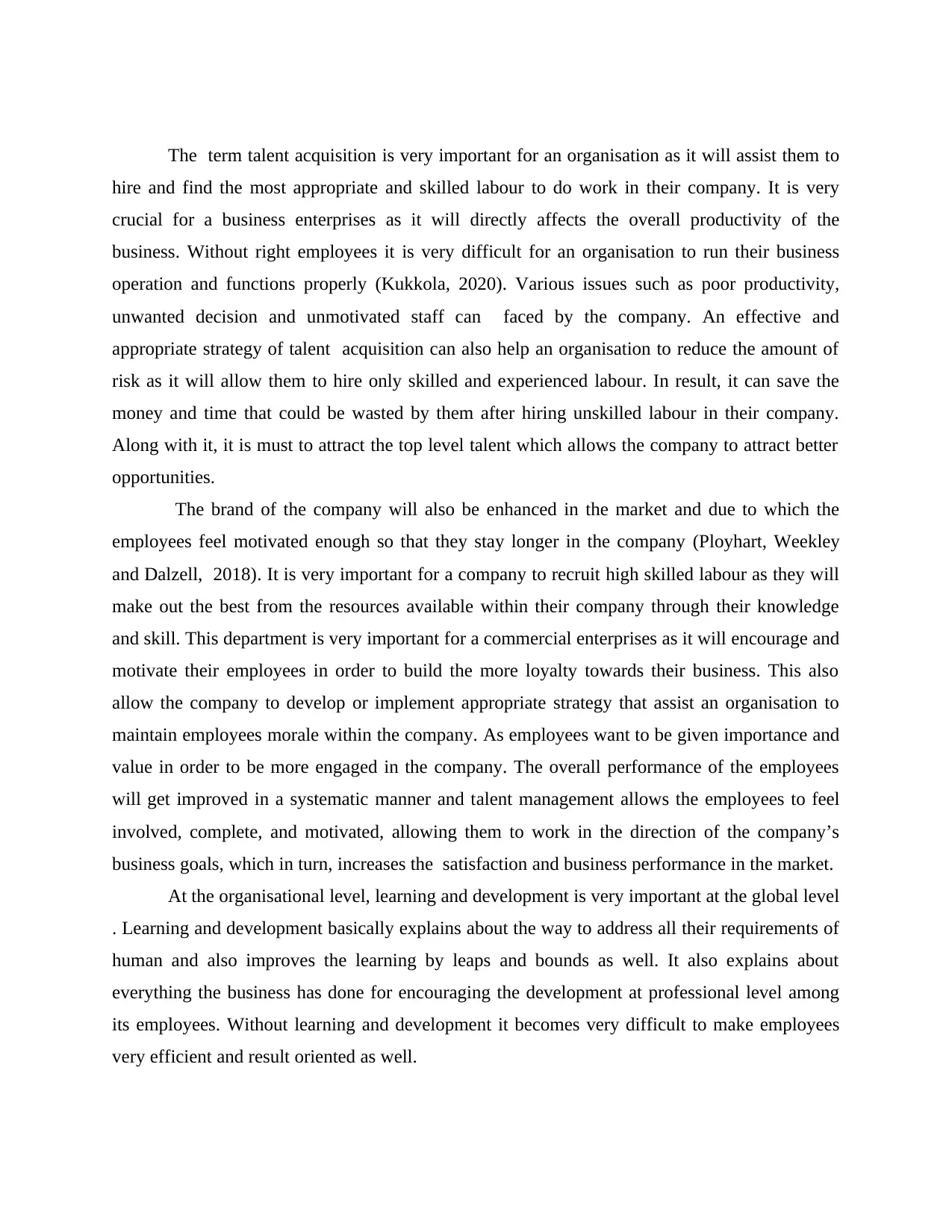
The term talent acquisition is very important for an organisation as it will assist them to
hire and find the most appropriate and skilled labour to do work in their company. It is very
crucial for a business enterprises as it will directly affects the overall productivity of the
business. Without right employees it is very difficult for an organisation to run their business
operation and functions properly (Kukkola, 2020). Various issues such as poor productivity,
unwanted decision and unmotivated staff can faced by the company. An effective and
appropriate strategy of talent acquisition can also help an organisation to reduce the amount of
risk as it will allow them to hire only skilled and experienced labour. In result, it can save the
money and time that could be wasted by them after hiring unskilled labour in their company.
Along with it, it is must to attract the top level talent which allows the company to attract better
opportunities.
The brand of the company will also be enhanced in the market and due to which the
employees feel motivated enough so that they stay longer in the company (Ployhart, Weekley
and Dalzell, 2018). It is very important for a company to recruit high skilled labour as they will
make out the best from the resources available within their company through their knowledge
and skill. This department is very important for a commercial enterprises as it will encourage and
motivate their employees in order to build the more loyalty towards their business. This also
allow the company to develop or implement appropriate strategy that assist an organisation to
maintain employees morale within the company. As employees want to be given importance and
value in order to be more engaged in the company. The overall performance of the employees
will get improved in a systematic manner and talent management allows the employees to feel
involved, complete, and motivated, allowing them to work in the direction of the company’s
business goals, which in turn, increases the satisfaction and business performance in the market.
At the organisational level, learning and development is very important at the global level
. Learning and development basically explains about the way to address all their requirements of
human and also improves the learning by leaps and bounds as well. It also explains about
everything the business has done for encouraging the development at professional level among
its employees. Without learning and development it becomes very difficult to make employees
very efficient and result oriented as well.
hire and find the most appropriate and skilled labour to do work in their company. It is very
crucial for a business enterprises as it will directly affects the overall productivity of the
business. Without right employees it is very difficult for an organisation to run their business
operation and functions properly (Kukkola, 2020). Various issues such as poor productivity,
unwanted decision and unmotivated staff can faced by the company. An effective and
appropriate strategy of talent acquisition can also help an organisation to reduce the amount of
risk as it will allow them to hire only skilled and experienced labour. In result, it can save the
money and time that could be wasted by them after hiring unskilled labour in their company.
Along with it, it is must to attract the top level talent which allows the company to attract better
opportunities.
The brand of the company will also be enhanced in the market and due to which the
employees feel motivated enough so that they stay longer in the company (Ployhart, Weekley
and Dalzell, 2018). It is very important for a company to recruit high skilled labour as they will
make out the best from the resources available within their company through their knowledge
and skill. This department is very important for a commercial enterprises as it will encourage and
motivate their employees in order to build the more loyalty towards their business. This also
allow the company to develop or implement appropriate strategy that assist an organisation to
maintain employees morale within the company. As employees want to be given importance and
value in order to be more engaged in the company. The overall performance of the employees
will get improved in a systematic manner and talent management allows the employees to feel
involved, complete, and motivated, allowing them to work in the direction of the company’s
business goals, which in turn, increases the satisfaction and business performance in the market.
At the organisational level, learning and development is very important at the global level
. Learning and development basically explains about the way to address all their requirements of
human and also improves the learning by leaps and bounds as well. It also explains about
everything the business has done for encouraging the development at professional level among
its employees. Without learning and development it becomes very difficult to make employees
very efficient and result oriented as well.
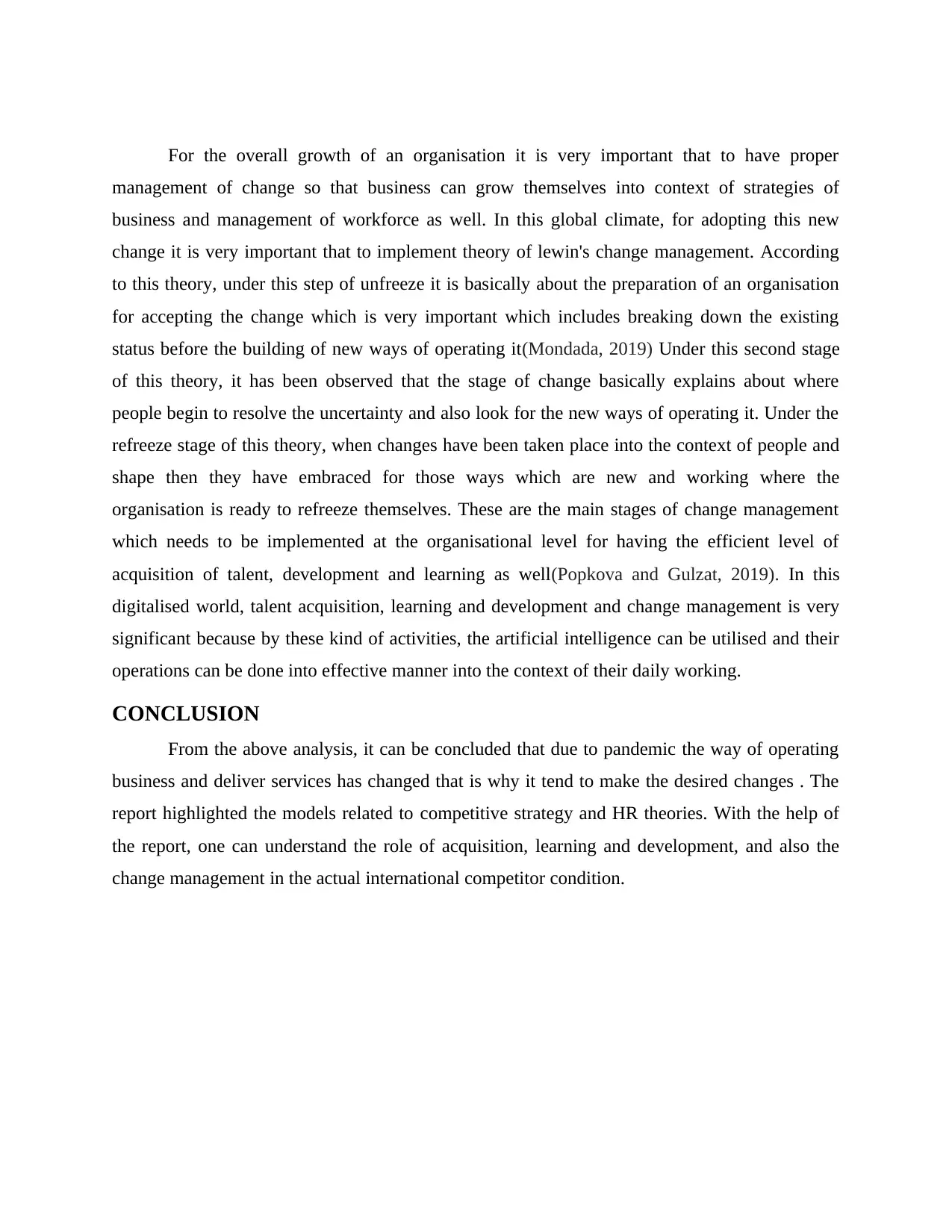
For the overall growth of an organisation it is very important that to have proper
management of change so that business can grow themselves into context of strategies of
business and management of workforce as well. In this global climate, for adopting this new
change it is very important that to implement theory of lewin's change management. According
to this theory, under this step of unfreeze it is basically about the preparation of an organisation
for accepting the change which is very important which includes breaking down the existing
status before the building of new ways of operating it(Mondada, 2019) Under this second stage
of this theory, it has been observed that the stage of change basically explains about where
people begin to resolve the uncertainty and also look for the new ways of operating it. Under the
refreeze stage of this theory, when changes have been taken place into the context of people and
shape then they have embraced for those ways which are new and working where the
organisation is ready to refreeze themselves. These are the main stages of change management
which needs to be implemented at the organisational level for having the efficient level of
acquisition of talent, development and learning as well(Popkova and Gulzat, 2019). In this
digitalised world, talent acquisition, learning and development and change management is very
significant because by these kind of activities, the artificial intelligence can be utilised and their
operations can be done into effective manner into the context of their daily working.
CONCLUSION
From the above analysis, it can be concluded that due to pandemic the way of operating
business and deliver services has changed that is why it tend to make the desired changes . The
report highlighted the models related to competitive strategy and HR theories. With the help of
the report, one can understand the role of acquisition, learning and development, and also the
change management in the actual international competitor condition.
management of change so that business can grow themselves into context of strategies of
business and management of workforce as well. In this global climate, for adopting this new
change it is very important that to implement theory of lewin's change management. According
to this theory, under this step of unfreeze it is basically about the preparation of an organisation
for accepting the change which is very important which includes breaking down the existing
status before the building of new ways of operating it(Mondada, 2019) Under this second stage
of this theory, it has been observed that the stage of change basically explains about where
people begin to resolve the uncertainty and also look for the new ways of operating it. Under the
refreeze stage of this theory, when changes have been taken place into the context of people and
shape then they have embraced for those ways which are new and working where the
organisation is ready to refreeze themselves. These are the main stages of change management
which needs to be implemented at the organisational level for having the efficient level of
acquisition of talent, development and learning as well(Popkova and Gulzat, 2019). In this
digitalised world, talent acquisition, learning and development and change management is very
significant because by these kind of activities, the artificial intelligence can be utilised and their
operations can be done into effective manner into the context of their daily working.
CONCLUSION
From the above analysis, it can be concluded that due to pandemic the way of operating
business and deliver services has changed that is why it tend to make the desired changes . The
report highlighted the models related to competitive strategy and HR theories. With the help of
the report, one can understand the role of acquisition, learning and development, and also the
change management in the actual international competitor condition.
⊘ This is a preview!⊘
Do you want full access?
Subscribe today to unlock all pages.

Trusted by 1+ million students worldwide
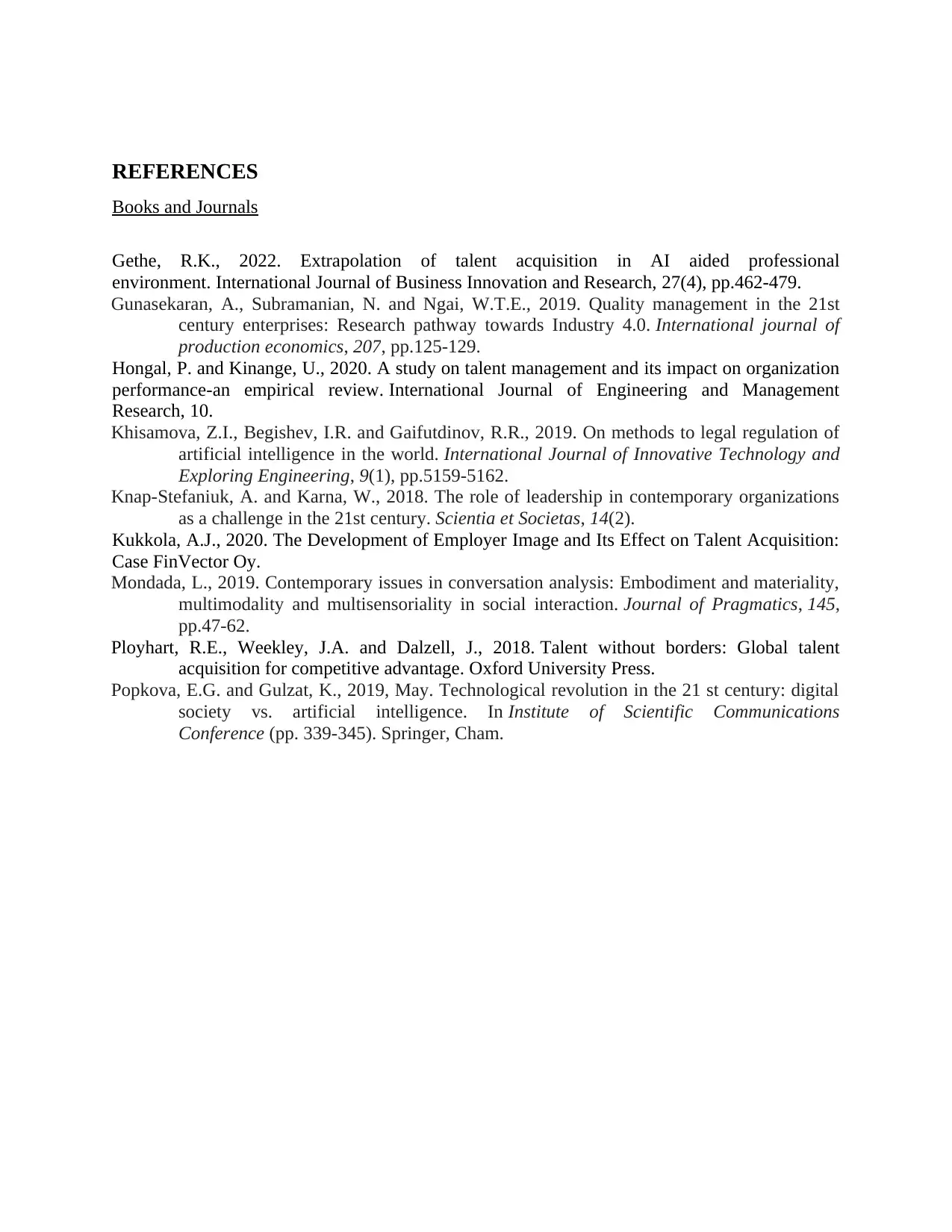
REFERENCES
Books and Journals
Gethe, R.K., 2022. Extrapolation of talent acquisition in AI aided professional
environment. International Journal of Business Innovation and Research, 27(4), pp.462-479.
Gunasekaran, A., Subramanian, N. and Ngai, W.T.E., 2019. Quality management in the 21st
century enterprises: Research pathway towards Industry 4.0. International journal of
production economics, 207, pp.125-129.
Hongal, P. and Kinange, U., 2020. A study on talent management and its impact on organization
performance-an empirical review. International Journal of Engineering and Management
Research, 10.
Khisamova, Z.I., Begishev, I.R. and Gaifutdinov, R.R., 2019. On methods to legal regulation of
artificial intelligence in the world. International Journal of Innovative Technology and
Exploring Engineering, 9(1), pp.5159-5162.
Knap-Stefaniuk, A. and Karna, W., 2018. The role of leadership in contemporary organizations
as a challenge in the 21st century. Scientia et Societas, 14(2).
Kukkola, A.J., 2020. The Development of Employer Image and Its Effect on Talent Acquisition:
Case FinVector Oy.
Mondada, L., 2019. Contemporary issues in conversation analysis: Embodiment and materiality,
multimodality and multisensoriality in social interaction. Journal of Pragmatics, 145,
pp.47-62.
Ployhart, R.E., Weekley, J.A. and Dalzell, J., 2018. Talent without borders: Global talent
acquisition for competitive advantage. Oxford University Press.
Popkova, E.G. and Gulzat, K., 2019, May. Technological revolution in the 21 st century: digital
society vs. artificial intelligence. In Institute of Scientific Communications
Conference (pp. 339-345). Springer, Cham.
Books and Journals
Gethe, R.K., 2022. Extrapolation of talent acquisition in AI aided professional
environment. International Journal of Business Innovation and Research, 27(4), pp.462-479.
Gunasekaran, A., Subramanian, N. and Ngai, W.T.E., 2019. Quality management in the 21st
century enterprises: Research pathway towards Industry 4.0. International journal of
production economics, 207, pp.125-129.
Hongal, P. and Kinange, U., 2020. A study on talent management and its impact on organization
performance-an empirical review. International Journal of Engineering and Management
Research, 10.
Khisamova, Z.I., Begishev, I.R. and Gaifutdinov, R.R., 2019. On methods to legal regulation of
artificial intelligence in the world. International Journal of Innovative Technology and
Exploring Engineering, 9(1), pp.5159-5162.
Knap-Stefaniuk, A. and Karna, W., 2018. The role of leadership in contemporary organizations
as a challenge in the 21st century. Scientia et Societas, 14(2).
Kukkola, A.J., 2020. The Development of Employer Image and Its Effect on Talent Acquisition:
Case FinVector Oy.
Mondada, L., 2019. Contemporary issues in conversation analysis: Embodiment and materiality,
multimodality and multisensoriality in social interaction. Journal of Pragmatics, 145,
pp.47-62.
Ployhart, R.E., Weekley, J.A. and Dalzell, J., 2018. Talent without borders: Global talent
acquisition for competitive advantage. Oxford University Press.
Popkova, E.G. and Gulzat, K., 2019, May. Technological revolution in the 21 st century: digital
society vs. artificial intelligence. In Institute of Scientific Communications
Conference (pp. 339-345). Springer, Cham.
Paraphrase This Document
Need a fresh take? Get an instant paraphrase of this document with our AI Paraphraser


⊘ This is a preview!⊘
Do you want full access?
Subscribe today to unlock all pages.

Trusted by 1+ million students worldwide
1 out of 9